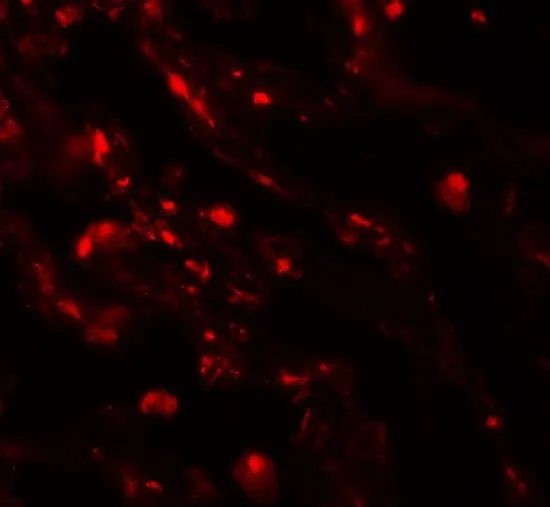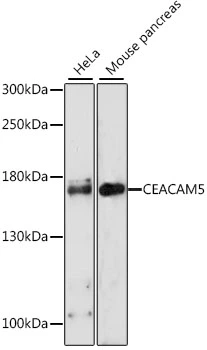![IHC-P analysis of human colon carcinoma tissue using GTX17238 CEA antibody [Col-1] (ready-to-use). IHC-P analysis of human colon carcinoma tissue using GTX17238 CEA antibody [Col-1] (ready-to-use).](https://www.genetex.com/upload/website/prouct_img/normal/GTX17238/GTX17238_20191203_IHC-P_35_w_23060620_509.webp)
IHC-P analysis of human colon carcinoma tissue using GTX17238 CEA antibody [Col-1] (ready-to-use).
CD66e antibody[Col-1](ready-to-use)
GTX17238
ApplicationsImmunoHistoChemistry, ImmunoHistoChemistry Paraffin
Product group Antibodies
TargetCEACAM5
Overview
- SupplierGeneTex
- Product NameCEA antibody [Col-1] (ready-to-use)
- Delivery Days Customer9
- Application Supplier NoteIHC-P: . *Optimal dilutions/concentrations should be determined by the researcher.Not tested in other applications.
- ApplicationsImmunoHistoChemistry, ImmunoHistoChemistry Paraffin
- CertificationResearch Use Only
- ClonalityMonoclonal
- Clone IDCol-1
- ConjugateUnconjugated
- Gene ID1048
- Target nameCEACAM5
- Target descriptionCEA cell adhesion molecule 5
- Target synonymsCD66e, CEA, cell adhesion molecule CEACAM5, carcinoembryonic antigen related cell adhesion molecule 5, meconium antigen 100
- HostMouse
- IsotypeIgG2a
- Protein IDP06731
- Protein NameCarcinoembryonic antigen-related cell adhesion molecule 5
- Scientific DescriptionThis gene encodes a cell surface glycoprotein that represents the founding member of the carcinoembryonic antigen (CEA) family of proteins. The encoded protein is used as a clinical biomarker for gastrointestinal cancers and may promote tumor development through its role as a cell adhesion molecule. Additionally, the encoded protein may regulate differentiation, apoptosis, and cell polarity. This gene is present in a CEA family gene cluster on chromosome 19. Alternative splicing results in multiple transcript variants. [provided by RefSeq, Jul 2015]
- Storage Instruction2°C to 8°C
- UNSPSC12352203
References
- Carcinoembryonic antigen as a specific glycoprotein ligand of rBC2LCN lectin on pancreatic ductal adenocarcinoma cells. Furuta T et al., 2021 Sep, Cancer SciRead more
- Human epididymis protein 4 immunostaining of malignant ascites differentiates cancer of Muellerian origin from gastrointestinal cancer. Stiekema A et al., 2017 Mar, Cancer CytopatholRead more

![FACS analysis of BxPC-3 cells using GTX15677 CEA antibody [1106]. Pink histogram : Primary antibody Black histogram : Isotype control antibody Dilution : 10 microg/ml in PBS + 5% FCS](https://www.genetex.com/upload/website/prouct_img/normal/GTX15677/GTX15677_105_FACS_w_23060620_902.webp)
![IHC-P analysis of human colon carcinoma tissue using GTX17254 CEA antibody [Col-1].](https://www.genetex.com/upload/website/prouct_img/normal/GTX17254/GTX17254_20191203_IHC-P_39_w_23060620_791.webp)


![ELISA analysis of antigen using GTX60388 CEA antibody [3G12]. Red : Control antigen 100ng Purple : Antigen 10ng Green : Antigen 50ng Blue : Antigen 100ng](https://www.genetex.com/upload/website/prouct_img/normal/GTX60388/GTX60388_20170912_ELISA_w_23061123_711.webp)